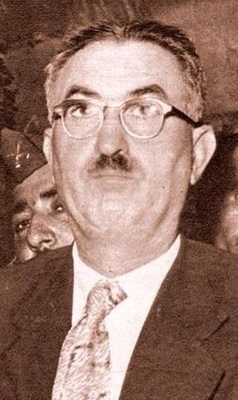
Muhammad Fadhel al-Jamali
Muhammad Fadhel al-Jamali (Arabic: محمد فاضل الجمالي) (20 April 1903 – 24 May 1997) was an Iraqi politician, statesman, Iraqi foreign affairs minister, and prime minister of Iraq from 1953 to 1954 from al-Kadhimiya, Baghdad. During the 1945 United Nations conference, al-Jamali, as Iraqi Minister of Foreign Affairs, signed the Charter of the United Nations on behalf of his country and continued to represent Iraq several times during United Nations meetings.[1]
Muhammad Fadhel al-Jamali
April 20, 1903
Kadhimiya, Baghdad, Kingdom of Iraq
Sara Powell
Al-Jamali is considered one of the most prominent figures in politics and education in Iraq and the Arab World along with being one of the most notable and well-known prime ministers during the Monarchy Era of Iraq, his academic excellence qualified him to obtain the most prestigious scientific degrees in the most prestigious universities in the world despite his upbringing in a conservative and religious environment.[2]
Arab Federation[edit]
During the Arab Federation, in which Iraq and Jordan united into a union, then-prime minister Nuri al-Said appointed al-Jamali as a member of the Arab Union Council in 21 May 1958 until 14 July of that year.[40]
Personal life[edit]
Marriage and kids[edit]
In 1932, al-Jamali was married to Sarah Powell (February 22, 1908—March 3, 2000), who was born in Saskatchewan, Canada to American parents. They met while studying at the Teachers College of Columbia University in the late 1920s. She moved to Iraq with Fadhel al-Jamali and they had three sons: Laith, Usama, and Abbas.[47] At a young age, Laith was stricken with encephalitis, which arrested his mental development. From her experience in caring for Laith, Sarah promoted public awareness of intellectual disability and wrote a book of her movement: The Story of Laith and His Life After Encephalitis. She also wrote Folktales from the City of the Golden Dome, a compilation of Iraqi folktales.[47]
Writings[edit]
While in prison he wrote a series of letters to his son setting out the teaching and practice of Islam and its relevance to the problems and experience of the modern world. Following his release from prison, he compiled those letters into a book Letters on Islam. In one of his memoirs, he stated:
The book's topics are man's need for religious faith; the Qur'an as guidance; the significance of fasting; science and faith; the nature of religious experience; the meaning of Islam; science, philosophy, and religion; the Islamic creed; Islamic rituals; the social system of Islam (legislation, the family, characteristics, economic principles, social, and government); and morality in Islam. In the book, al-Jamali detailed his beliefs:
Throughout al-Jamali's life, he wrote many books and published many articles in Arab, English, American, and French newspapers and magazines. Among his works are Suggested Directions for Education in England after the War (1943), The Future of Education in Iraq (1944), Raising the New Man (1947), Iraq's call to the Arab Union (1954), Iraq between yesterday and today (1954), An Open Letter to the honorable Iraqi People (1969), The Prospects for modern education in Developing Countries (1988), The Gulf Tragedy and Western Hegemony (1992), and Let the sun shine again on the Arab Nation (1996).[48]